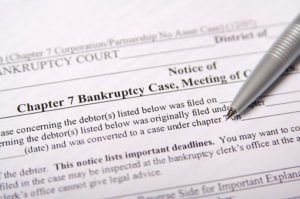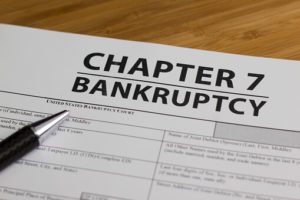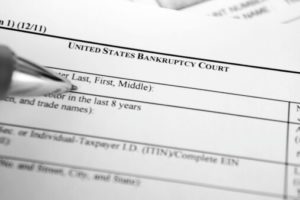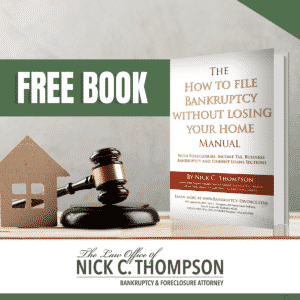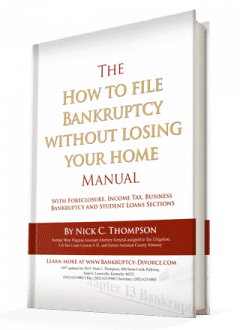Seventy Percent of Debtors must discharge unsecured debt quickly and return to their lives in a Chapter 7 bankruptcy. Chapter 7 is easier, quicker, and less expensive than filing a Chapter 13. Something horrible like a lost job, death in a family, disability, or divorce is often the cause of excess debt. Chapter 7 Bankruptcy is the ultimate cure for unsecured debt when you have substantial equity in your property.
Over 95% of the people we see qualify for Chapter 7. However, you can only file one Chapter 7 every eight years from the date the first case was filed until the following Chapter 7 case is filed. If you know the rules, you can ensure you qualify for Chapter 7 bankruptcy, so you don’t have to spend five years repaying all your disposable income in Chapter 13. The rules to qualify for a Chapter 7 bankruptcy tend to revolve around not having the income to fund a Chapter 13 and not having too much equity in property.
Conditions to Qualify for a Chapter 7 Bankruptcy
When was the last time you increased your net worth from 20,000 to 100,000 or more within 8 hours and 45 days? With bankruptcy, most Debtors increase their net worth, and you also increase your credit score. That is precisely what most Chapter 7 cases do. Probably never.
You probably never made so much money in so short a time for so little you invested in your time and money. The attorney fee runs about $1400 for a single person and 1600 for a couple in 2022 plus the filing fee of $338. The perfect conditions for a Chapter 7 occur when you have a large amount of unsecured debt and little to no income and equity in your assets. Over 99% of people never lose any assets. You can keep over 28,900 in equity in your home using the federal exemptions.
How to Qualify for Chapter 7 Bankruptcy
About 97% of Americans qualify for Chapter 7 bankruptcy. However, attorneys are paid 3 to 4 times more for Chapter 13 cases. If you time your bankruptcy, increase the reasonable expenses, and decrease the prior six months of average monthly income, it is usually easy to qualify. To avoid filing Chapter 13, you need to know why some people are forced to file Chapter 13.
Chapter 7 Cases can not be paid over time and cost less in the long run.
One of the problems with filing a Chapter 7 is the upfront cost. When you file for Chapter 7 bankruptcy, your pre-petition debts become uncollectible. This includes any attorney fees for work that is done pre-petition. So, if the attorney works on your case before filing, he can’t collect after you file. Doing that is a violation of the stay and an ethics violation. His fees are no different than a credit card debt and are discharged at the end of a Chapter 7 case.
This means poor people, when they can least afford it, are forced to pay about 2,000 dollars to file. Many attorneys talk them into filing as a Chapter 13 to avoid the upfront costs of Chapter 7. Which is cheaper: 2,000 dollars upfront or 200 per month for five years in 60 payments, which is 12,000 dollars? Some attorneys will attempt to place you in Chapter 13, earning them a 4,100 dollar fee instead of a Chapter 7 attorney fee of 1400. Chapter 13 allows the court to pay the trustee and attorney fees after filing the case. However, Chapter 13 may not be the best choice.
 Reasons to Consider Avoiding Chapter 13
Reasons to Consider Avoiding Chapter 13
You automatically qualify for Chapter 7 bankruptcy if your current monthly income is less than the average monthly income for your family size. Even if your current monthly income is above average, you can qualify if you have no significant excess gross income after deducting reasonable and necessary monthly expenses. This page has the average amounts for your budget in 2020. For the up-to-date qualifying amounts in Kentucky, call our office. Toni has it taped to her monitor.
We review your monthly expenses in our office for allowed expenses and include costs other law offices often forget. Some attorneys may disallow 401k retirement expenses, but we expense any reasonable deductions for retirement. There are often-overlooked expenses that may help you qualify for Chapter 13. This can include private school expenses for a disabled child and other costs.
Why Do You Have to Review the Expenses?
We review your current monthly income and deductions for these necessary and reasonable expenses, such as your daycare, mortgage, and car payments. If significant money is left over, you may have to file as Chapter 13 and repay something. But repaying zero is probably better if you can qualify for it.
A Chapter 13 plan won’t work if necessary expenses are left out. If a bankruptcy lawyer leaves out expenses, you may be forced into Chapter 13, but you won’t be able to a Chapter 13. Here are the most up-to-date US Trustee median income guides for each family in 2020 and later. A single person can make over 44,500 in 2021 and automatically pass. A family of 5 is over 100,000. These amounts are constantly increasing.
 Include and Document Future Expenses in Your Budget
Include and Document Future Expenses in Your Budget
It may be months or years before you incur monthly expenses like a replacement vehicle. However, a furnace replacement and other items must be within the budget if they are definite and foreseeable. Some people replace an auto before filing, so less is paid to creditors in Chapter 13, or they can qualify for a Chapter 7. A furnace, car, or tax repayment can be part of your budget, so you don’t have to do without necessary items later.
A quality attorney understands these needs and plans them in the budget so you can qualify and file as a Chapter 7. High medical expenses like $1000 per month in diabetic medications are just one example of a high reasonable or necessary expense. Any required daycare must also be included in the budget. The bankruptcy judge and trustees generally trust clients but ask for expense verification if items are expensive and above average.
 Timing your Chapter 7 Bankruptcy Every Eight Years
Timing your Chapter 7 Bankruptcy Every Eight Years
You can only file one Chapter 7 bankruptcy every eight years. This is calculated from filing the first case until the second filing date. You can file a Chapter 13 immediately after Chapter 7 to catch up on your foreclosure or for other valid reasons. However, you only get a discharge in Chapter 7 or 13 by waiting the required time. The type of chapter you want to file, what you filed before, and how much a chapter 13 pays back dramatically change how long you must wait. Filing one Chapter 7 after a prior Chapter 7 is eight years, the longest period.
In some cases, you may not need the discharge of Chapter 13. Chapter 13 cases that only need to catch up with a mortgage or manage student loans or tax debts might not require a permanent discharge or have a waiting period.
Reasons for Chapter 13 or 7
There are valid reasons for a Chapter 13 debt repayment plan. First, only Chapter 13 allows you the time you might need to catch up on a mortgage. Chapter 13 stops collections and foreclosures for the 5-year period. Only Chapter 13 will enable you to avoid repaying student loans for up to five years. Chapter 13 also protects you from IRS debts and gives you up to five years to repay priority or secured portions of an income tax debt and repay unsecured debt at 10% or less.
You are allowed to keep a minor amount of equity in a home. Each person on the deed can keep over $28,900 in equity under the 2024 Federal exemptions. This amount changes yearly, and each state chooses whether to use the federal or state exemptions. Kentucky uses federal exemptions, while Indiana has lower state exemptions. You can keep $4,500 in equity in an auto and about $17,900 in household goods in Kentucky and file a Chapter 7.
You Don’t Have to Lose Property
People who own more than $28,900 in home equity per person on the deed do not have to lose their homes in Kentucky. Suppose they have only 5,000 or 10,000 too much equity. In that case, the trustee will not usually bother administering such a small estate, which would have little benefit for the secured and unsecured creditors. Homes are valued at the PVA or liquidation value in Chapter 13. In Chapter 7, the trustee will look at the Zillow value.
If you have $75,000 too much equity in your home, Chapter 13 needs to repay $75,000 if you want to keep a home. You are only at risk of losing property when you have substantially excess equity in Chapter 7. A Chapter 7 trustee may force you to remain in Chapter 7 and force a sale. You are not required to stay in Chapter 13 if the case becomes problematic. Chapter 13 is always the safe option if you believe you may have too much equity. A Chapter 7 trustee is paid a percentage of what is repaid to secured and unsecured creditors. A Chapter 7 Trustee has selfish reasons for keeping you in the case and selling your property if there have been fraudulent transfers or if there is too much equity.
The Totality of the Circumstances Test in Chapter 7
Even if you pass the means test and receive credit counseling from an approved credit counseling agency, you can still be forced into Chapter 13 if all the circumstances show you can repay a significant amount in 13.
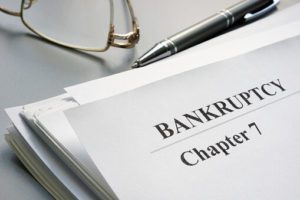
The Totality of the Circumstances Test and Future Income
The same problem happens to someone laid off for the prior six months and is now back to work at his $100,000 job for a family of two. The means test uses the average of his previous six months of gross income. Being laid off for a month or two may lower your prior six months of income enough to pass the means test.
But if you file bankruptcy just before accepting a $150,000 promotion, you probably have waited too late to file. The bankruptcy court looks into the future and the prior six months against the median income.
If your current monthly income drops, you may be allowed to file as Chapter 7. But, if it is obvious this is just temporary, the bankruptcy court will look at all the factors to determine whether filing as a Chapter 7 is an abuse. So how can you know whether you can file as a Chapter 7?
Planning your Chapter 7 Bankruptcy Process
Although the bankruptcy system is designed to catch fraud, but there is nothing wrong with adequately planning a bankruptcy. You should file a Chapter 7 bankruptcy when you have a low income and have little or no assets. You can plan a bankruptcy to take the maximum amount you can use in exemptions.
An experienced attorney plans your exemptions to keep the property. He looks over your budget to ensure any Chapter 13 plan is affordable and that every Chapter 7 has eliminated unwanted and unnecessary debts. The purpose of bankruptcy is to have a fresh start on a budget you can afford.
An Example of Proper Planning
An example of proper planning is when you have an asset and then change it into a different asset or spend down the asset before filing. For instance, you may have $10,000 in your bank account and own a 1995 Jeep that is only worth $4,000. If you spend $10,000 on a new motor, transmission, tires, and winch on the Jeep, the Jeep is still only worth $4,000. But you don’t have to turn over the $10,000 to the trustee. Another example is maintenance and repairs on your home and medical procedures. Spending cash or selling an auto to pay for a house repair is not fraudulent. And the repair does not increase the appraised value of the home. Buying a new Jeep and having a new car payment may lower your Chapter 13 plan payment or give you the necessary expense to qualify as a Chapter 7 bankruptcy.
You only want to file a Chapter 13 when you have to control certain types of debts. The mortgage payments get caught up in Chapter 13. Or, a Chapter 13 can repay the car, lower a car loan interest rate, or pay priority taxes. Often, a Chapter 13 only repays debts you would have repaid anyway. However, by filing a Chapter 13, debtors often repay far less in penalties and interest or may strip a second mortgage if it has no equity.
Avoiding Fraudulent and Preferential Transfers
Over-paying or giving a lien to a secured creditor just before filing is an example of a preferential transfer. Creditor garnishments are another example of a preferential transfer because the creditor got more than he would have received under Chapter 7. Preferential transfers and fraudulent transfers are often confusing because they are so similar. You can often recover garnishments in Chapter 7 or 13. Transfers within 90 days are recoverable.
You can wait a period. Then, a transfer for less than the total value is not fraudulent. This lookback period is two years in bankruptcy court, and in Kentucky state court, it is five years.
It isn’t illegal or improper to plan your bankruptcy to keep the property, but you must ensure you do not make any fraudulent transfers before filing. Fraudulent transfers may or may not be to friends and family. It is a fraudulent transfer if you sell your new Mercedes worth $50,000 for $1,000 before filing bankruptcy, whether to your mother or a stranger. However, it is a little more obvious when your girlfriend gets the auto. If you have questions about how to file a Chapter 7, be sure to contact us at 502-625-0905 today.
 The 5 Requirements to Qualify for Chapter 7 Bankruptcy the Checklist
The 5 Requirements to Qualify for Chapter 7 Bankruptcy the Checklist
1. The Waiting Periods
First, you must wait a period since filing your last Chapter 7 or Chapter 13. If you last filed a Chapter 7, you must wait eight years after filing the last case before filing a new case.
2. The Means Test and Net Income Requirements
Second, your current monthly income must be below the average for your size family, or if your income is above average, your budget must have no disposable income. About 95% or more of Americans qualify. However, it isn’t enough to pass the means test. If you have a lavish lifestyle, you are still a Chapter 13. Most families of five will still qualify in 2024 if they make 10,000 and have a regular mortgage payment.
3. Non-Exempt Property
Third, You must not have an excessive amount of property. You can keep 4,500 equity per person on the car title and 27,800 per person on the deed. See our page on what the federal exemptions allow you to keep. About half the states use the federal exemptions. The other half use their state exemptions.
4. Fraudulent Transfers and Preferential Transfers
Fourth, you must not have given away property within the last two years for less than its fair market value. Giving away property creates a fraudulent transfer or preferential transfer. Give away a house or your expensive car to Mom just before filing, and the Trustee can sue her and take away the car as a fraudulent transfer. If a creditor garnishes your bank account, he takes a preferential transfer if it is over 600 dollars in our district. Amounts over 600 can be recovered.
5. Having the Proper Debts
Chapter 7 works best if you have a high amount of unsecured debt. That is what it was designed to do. If your debt is primarily a home that is in foreclosure and your goal is to cure a foreclosure, then you should file a Chapter 13 if you wish to retain it. The same holds for income taxes less than three years old and priority debt. When you owe student loan debt and want to stop a lawsuit or garnishment, you probably want to file a Chapter 13 for debt relief.
Chapter 7 only lasts for four months before it is discharged. If you have priority income taxes, foreclosure, or student loans, you still have those problems after the four months it takes to discharge a Chapter 7. You can file a Chapter 7 first and discharge the unsecured debts. Then, you have no unsecured debts to repay in Chapter 13. This can make a Chapter 13 much cheaper. People often talk about this as a Chapter 20 because two cases a Chapter 7 and 13, were filed to make the Chapter 13 payment less.
You can file a Chapter 13 after Chapter 7 to manage foreclosures, taxes, or student loan debt. You may not have waited long enough to get a second discharge. But if you just got a discharge last month in Chapter 7, you probably don’t need another one.
When should we stop using credit cards before filing Chapter 7 bankruptcy?
You want to stop using credit cards about 90 days before filing a Chapter 7 because a section of the code claims that debts charged within 90 days before filing bankruptcy are often presumed fraudulent. It is improper to charge, knowing you are filing.
However, it is rare for a creditor to object, and the only penalty is that you would remain liable for the charges you made within those 90 days. You occasionally see a client who charges up a credit card or payday loan to file a bankruptcy. It is rare for these debts to file an adversary to get the money back.
Assets Considered in Chapter 7 Bankruptcy
The assets in bankruptcy include anything you have a right to. This includes personal injury lawsuits and any inheritance you get within six months after filing.
